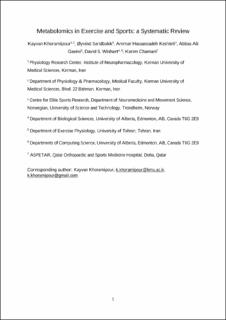Metabolomics in Exercise and Sports: A Systematic Review
Khoramipour, Kayvan; Sandbakk, Øyvind Bucher; Keshteli, Ammar Hassanzadeh; Gaeini, Abbas Ali; Wishart, David S.; Chamari, Karim
Peer reviewed, Journal article
Accepted version
Permanent lenke
https://hdl.handle.net/11250/2986012Utgivelsesdato
2021Metadata
Vis full innførselSamlinger
Sammendrag
Background
Metabolomics is a field of omics science that involves the comprehensive measurement of small metabolites in biological samples. It is increasingly being used to study exercise physiology and exercise-associated metabolism. However, the field of exercise metabolomics has not been extensively reviewed or assessed.
Objective
This review on exercise metabolomics has three aims: (1) to provide an introduction to the general workflow and the different metabolomics technologies used to conduct exercise metabolomics studies; (2) to provide a systematic overview of published exercise metabolomics studies and their findings; and (3) to discuss future perspectives in the field of exercise metabolomics.
Methods
We searched electronic databases including Google Scholar, Science Direct, PubMed, Scopus, Web of Science, and the SpringerLink academic journal database between January 1st 2000 and September 30th 2020.
Results
Based on our detailed analysis of the field, exercise metabolomics studies fall into five major categories: (1) exercise nutrition metabolism; (2) exercise metabolism; (3) sport metabolism; (4) clinical exercise metabolism; and (5) metabolome comparisons. Exercise metabolism is the most popular category. The most common biological samples used in exercise metabolomics studies are blood and urine. Only a small minority of exercise metabolomics studies employ targeted or quantitative techniques, while most studies used untargeted metabolomics techniques. In addition, mass spectrometry was the most commonly used platform in exercise metabolomics studies, identified in approximately 54% of all published studies. Our data indicate that biomarkers or biomarker panels were identified in 34% of published exercise metabolomics studies.
Conclusion
Overall, there is an increasing trend towards better designed, more clinical, mass spectrometry-based metabolomics studies involving larger numbers of participants/patients and larger numbers of metabolites being identified.
